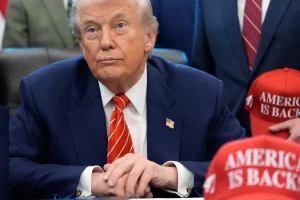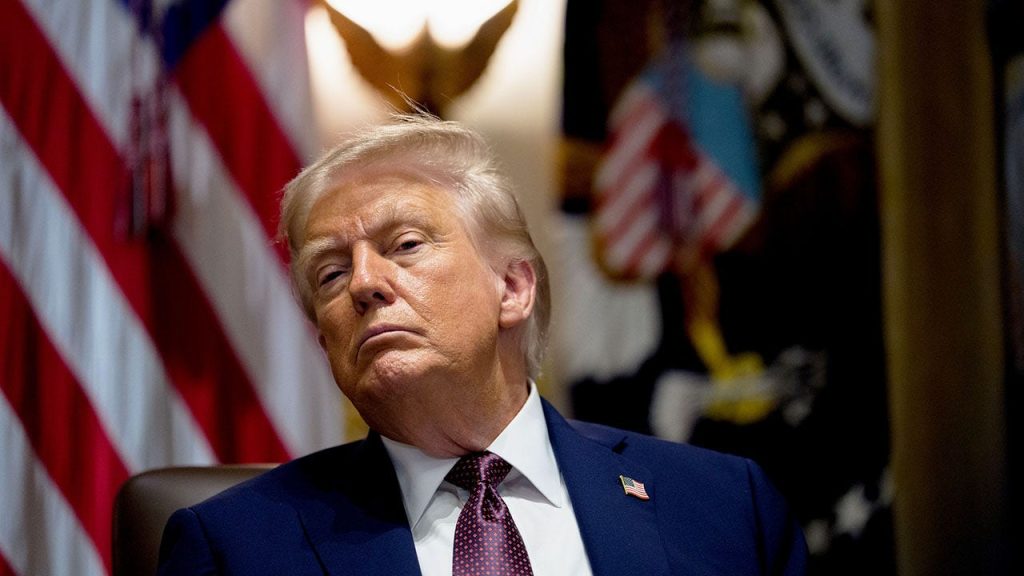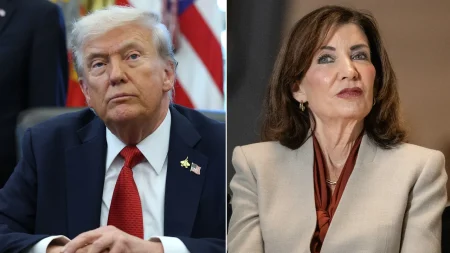Senate Republicans Seek Rule Change for Trump Nominees
Senate Republicans are inching closer to modifying the upper chamber’s rules to streamline confirmation of President Donald Trump’s lower-level nominees, reviving a proposal originally conceived by Democrats. This move comes as Republicans face unprecedented obstruction in confirming Trump’s appointments, with Senate Majority Whip John Barrasso noting, “The Democrats should support it, because it was their original proposal that we’re continuing on.” The historic blockade by Democrats has left 149 nominees awaiting confirmation, creating a backlog that Republicans argue is unsustainable and damaging to the functioning of government. Interestingly, the proposal under consideration originated from 2023 legislation introduced by Democratic Senators Amy Klobuchar, Angus King, and former Senator Ben Cardin, though Republicans are considering their own modifications to the framework.
The core of the Republican proposal would allow the Senate to take a single vote to confirm multiple sub-Cabinet level positions at once, known as confirming nominees “en bloc.” This approach has been a standard practice for previous administrations but has been notably absent during Trump’s current term. Senate Majority Leader John Thune emphasized this departure from tradition, stating, “This is the first president in history who, at this point in his presidency, hasn’t had at least one nominee clear by unanimous consent or voice vote.” The only nominee to move smoothly through the confirmation process has been Secretary of State Marco Rubio in January, while dozens of other positions throughout the federal bureaucracy remain unfilled due to Democrats blocking fast-track procedures typically used for lower-level positions.
Behind closed doors, Republicans have been strategizing on the most effective approach to implement this rule change before lawmakers depart for a week-long recess on September 22. While they would prefer bipartisan support for the change, they are prepared to pursue the “nuclear option” – changing Senate rules with a simple majority vote – if Democrats continue their obstruction. Senator James Lankford, who has worked alongside Thune and Barrasso to build consensus on the proposal, revealed that some Democratic colleagues privately acknowledge they’ve “created a precedent that is not sustainable” but feel pressured by progressive supporters to maintain opposition to Trump nominees regardless of the institutional damage to the Senate.
The political dynamics surrounding this issue are more complex than they initially appear. A senior GOP aide familiar with negotiations suggested that “Democrats privately support what Republicans are talking about. They’re just too afraid to admit it.” This behind-the-scenes reality creates a situation where public posturing may differ significantly from private sentiments. Senator Lankford captured this tension when describing conversations with Democratic colleagues, quoting them as saying, “I know I’m damaging the Senate, but I got to show that I’m fighting.” This disconnect between public resistance and private recognition of the problem has left Republicans feeling that Democrats are the ones truly “going nuclear” through their unprecedented obstruction.
Not all Democrats support the wholesale blockade strategy, however. Senator John Fetterman expressed a more moderate position, suggesting that basic consideration for nominees should be afforded to all administrations, regardless of party. “That’s not the resistance,” Fetterman stated, distinguishing between legitimate opposition to controversial nominees like Robert F. Kennedy Jr. for Health and Human Services Secretary and blanket obstruction of routine appointments. Meanwhile, Senator Klobuchar, while acknowledging her previous work with Lankford on Senate reforms, distanced herself from the Republican version of her legislation, claiming, “The reason that’s not happening right now is because the president keeps flaunting the law.”
The Republican proposal includes potential modifications to the original Democratic framework, such as possibly not limiting the number of nominees that could be confirmed en bloc in a single vote, or excluding judicial nominees from the expedited process. These adjustments reflect the specific challenges Republicans face in moving Trump’s nominees through the chamber and their determination to address what they view as unprecedented obstruction. With the growing backlog of nominees and limited legislative days before the next recess, pressure is mounting for a resolution that can restore some semblance of normalcy to the confirmation process while preserving the Senate’s institutional integrity.
As this procedural battle unfolds, it highlights broader questions about the Senate’s role in providing advice and consent on presidential nominations and how partisan politics can fundamentally alter institutional norms. The current impasse represents a significant departure from historical practices where routine, non-controversial nominations were processed efficiently through bipartisan cooperation. Whether Republicans proceed with the nuclear option or find a compromise solution with reluctant Democrats, the outcome will likely have lasting implications for how future administrations navigate the confirmation process and how the Senate fulfills its constitutional responsibilities in an increasingly polarized political environment.














